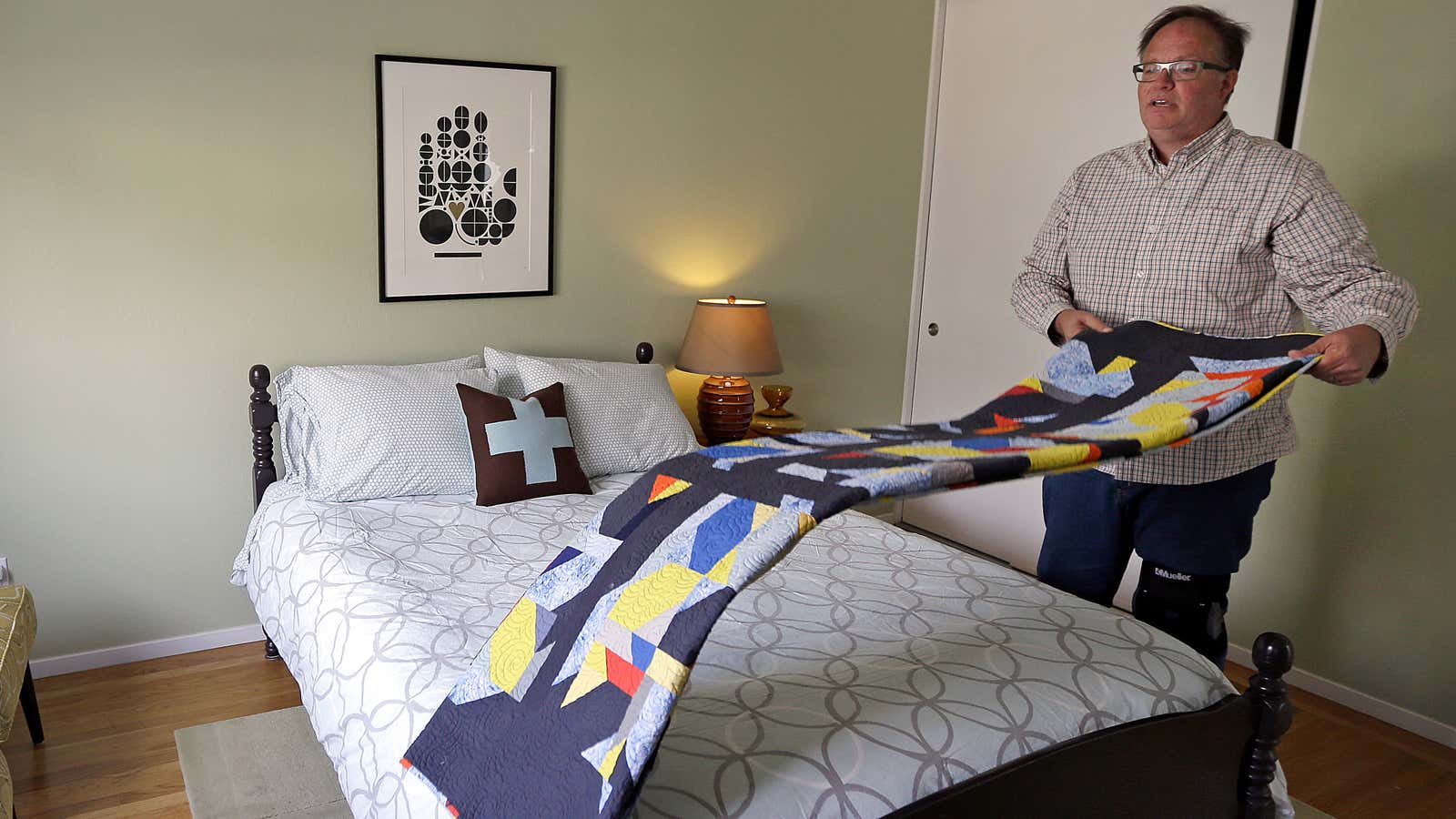The summer I lived in San Francisco, my two roommates and I won the Craiglist lottery. It was 2013, and we scored a sublet of a rent-controlled Victorian in the heart of the Mission District. We were granted our apartment on a unique set of terms: None of us were working in tech. Our landlord, in a personal act of resistance to gentrification, rejected any potential subletters who said they would be interning for Google, Facebook, or any of their startup ilk.
My roommates and I stayed for 72 days, which would fall just under the proposed limits on short-term rentals put forth by the so-called “Airbnb Law,” or Proposition F. The proposed law would have required companies like Airbnb to register their hosts with the city and help enforce a limit on short-term rentals to 75 days a year.
San Francisco voted to reject the law yesterday. But tensions over how the rise of the tech sector has increased competition for space in San Francisco remain fierce. With one-bedroom apartment rents now clocking upwards of $2700 per month, San Francisco is in the midst of an extraordinary housing crisis.
Eviction rates have steadily increased over the past five years, and San Francisco’s chief economist Ted Egan recently estimated that the city would have to add around 100,000 new units to see a meaningful increase in affordability. Just 3,454 new units were added in 2014. And only 757 were for affordable housing.
The failures of the city’s housing policies stem from a number of multifaceted problems. Contributing factors run the gamut from “restrictive zoning to overseas capital flows to a rapidly widening income distribution that is making it hard for lower- and middle-income to keep up with housing costs,” in the words of technology journalist Kim-Mai Cutler, who authored a comprehensive 2014 article about the Bay Area housing crisis.
But in recent years, the flow of technology money into San Francisco has perhaps pushed this system past its breaking point.
The issue is complicated. The internet has made San Francisco the epicenter of the global tech economy, and the city experienced some of the highest rates of job growth in the US between 2010 and 2014. But along with a terrible housing shortage, the rise of the tech sector has increased the cost of living and contributed to other increases in inequality, all of which has spurred widespread resentment of the tech industry across the Bay Area.
This brings us back to Prop F. Proponents of the law argued that, in such a tight housing market, any service that removes available units from the housing market can be seen as detrimental. In an investigative series on Airbnb’s impact on the city, The San Francisco Chronicle found that least 350 homes were removed from the market as a consequence of the company’s operations. (An official study commissioned by the city placed that figure higher, at 925 to 1,960 units.)
These figures suggest that Airbnb’s short-term rentals are just a small subset of the larger housing issues present in the Bay Area. Prop F would not have fixed much about the Bay Area housing crisis; if anything, it may have created more harm.
The key element of Prop F was a crackdown on 75-day rental caps. The enforcement measures would have also allowed individuals or groups to sue short-term rental hosts, even if the city found no violations of the policy. In a city where tensions over housing and gentrification are already ugly, this would have likely thrown open the floodgates for expensive and unproductive litigation.
The proposed law also failed to distinguish between hosted and un-hosted stays. From a housing policy perspective, hosted stays—when the owner of the property is present—likely have a very different footprint than stays where the owner is absent. Hosting on Airbnb may actually help people to stay in their homes, by giving them the opportunity to turn a spare bedroom or couch into a new source of income.
This is, in fact, the Airbnb origin story. The company was founded in 2008 when two guys started subletting their living room in order to help make rent.
There are no easy fixes for the housing imbroglio of San Francisco. But the tech industry, city government and longstanding San Francisco communities all need to move beyond adversarial relationships to make progress on a long-term, sustainable planning strategy. After all, the people of San Francisco include tech workers and yuppies as well as working-class residents, immigrant communities, middle-class families and senior citizens—and, yes, even people who use Airbnb.




